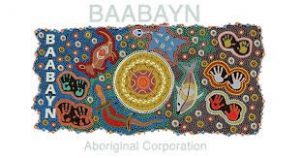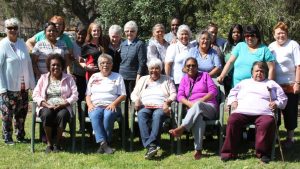Ruth Nelson shares a summary of “Baabayn Weaving and Reweaving: Just Sit and Be Quiet and Listen”, which she presented at the March Josephite Justice Network gathering.
 The research explores the model of healing that is offered at Baabayn Aboriginal Corporation, through a participatory action research process made up of a series of yarns. Yarning is an ancient method of holding conversations in a circle, where each person is equally valued, and where storytelling and reflecting is a relaxed way of gathering and analysing information. In this series of yarns, it is hoped that the participants contribute to the dream of building and strengthening Baabayn’s model of healing the harm done by colonisation and intergenerational trauma.
The research explores the model of healing that is offered at Baabayn Aboriginal Corporation, through a participatory action research process made up of a series of yarns. Yarning is an ancient method of holding conversations in a circle, where each person is equally valued, and where storytelling and reflecting is a relaxed way of gathering and analysing information. In this series of yarns, it is hoped that the participants contribute to the dream of building and strengthening Baabayn’s model of healing the harm done by colonisation and intergenerational trauma.
The paper first discusses the main cause of trauma in the community. Colonisation disrupted everything. It is important to understand the scale of loss Aboriginal people faced in the past, the destruction of lore and law, the loss of family in the Stolen Generation, the erosion of people’s connections to land, family and language. That violent disruption continues today in many ways including through deaths in custody, and in discrimination people experience in their contacts with systems which do not understand their way of speaking, thinking or interacting with the world
Baabayn is a space shaped by female elders. The word is reflective of the female energy and spirit of the centre. It has become healing for individuals, family and the community shaped by the values of Belonging, Unity, Respect, Culture, Healing, Connection, and Welcome. These values are largely expressed through the creation of space for listening and talking. Participants feel less alone when they visit Baabayn and some talked about sharing their experiences and problems in the space without feeling judged. Participants feel that having a regular place to freely talk and listen can stop suicide and self-harm.
The feeling created at Baabayn connects people with their culture, bringing together a diverse collective of over 20 Aboriginal groups. The feeling described is one of being grounded, of connecting spiritually and culturally to one’s people. It isn’t the services or instruction in itself that provides grounding, but wisdom, knowledge, yarning, sharing and laughing in a safe nurturing energetic cultural space.

The full research article by Cassandra Ebsworth, Bernard Hoffman, Ruth Nelson, Aunty Margaret Farrell, Ann-Marie Melito, Lilli Barto, Aunty Pat Fields, Leah Pearson, Racheal Munro, Aunty Christine O’Sullivan, (in photo to the left) can be found in Issue One of The Activist Practitioner.
Ruth Nelson
Josephite Justice Network
